Influences on BBC Staff Behaviour: Organisational Report and Analysis
VerifiedAdded on 2020/10/05
|17
|4628
|155
Report
AI Summary
This report provides an in-depth analysis of organisational behaviour within the British Broadcasting Corporation (BBC). It explores the influences of culture, power, and politics on staff behaviour, examining how these factors impact employee performance. The report delves into content and process theories of motivation, including Maslow's hierarchy of needs and Vroom's expectancy theory, illustrating how the BBC applies these concepts to motivate its employees and achieve its objectives. Furthermore, it discusses different types of teams within the BBC and applies Tuckman and Jensen's model to build effective teams. The report also considers how organisational behaviour principles can be used to improve team performance and productivity, while also identifying potential barriers to effective performance. The analysis highlights the importance of leadership, emotional intelligence, and soft skills in fostering a positive work environment and driving innovation within the BBC. Overall, the report provides a comprehensive overview of the organizational dynamics at the BBC and how they contribute to the achievement of its goals.
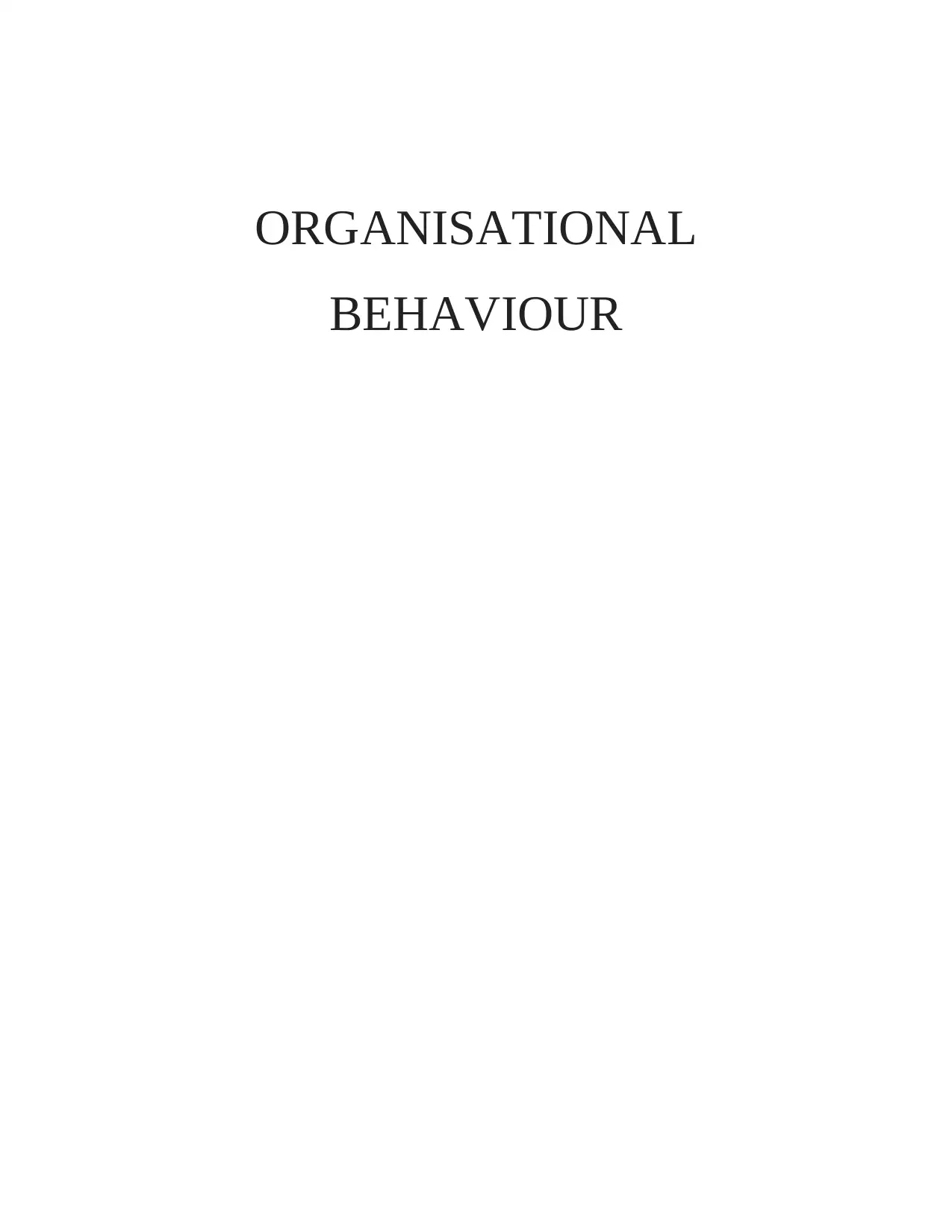
ORGANISATIONAL
BEHAVIOUR
BEHAVIOUR
Paraphrase This Document
Need a fresh take? Get an instant paraphrase of this document with our AI Paraphraser
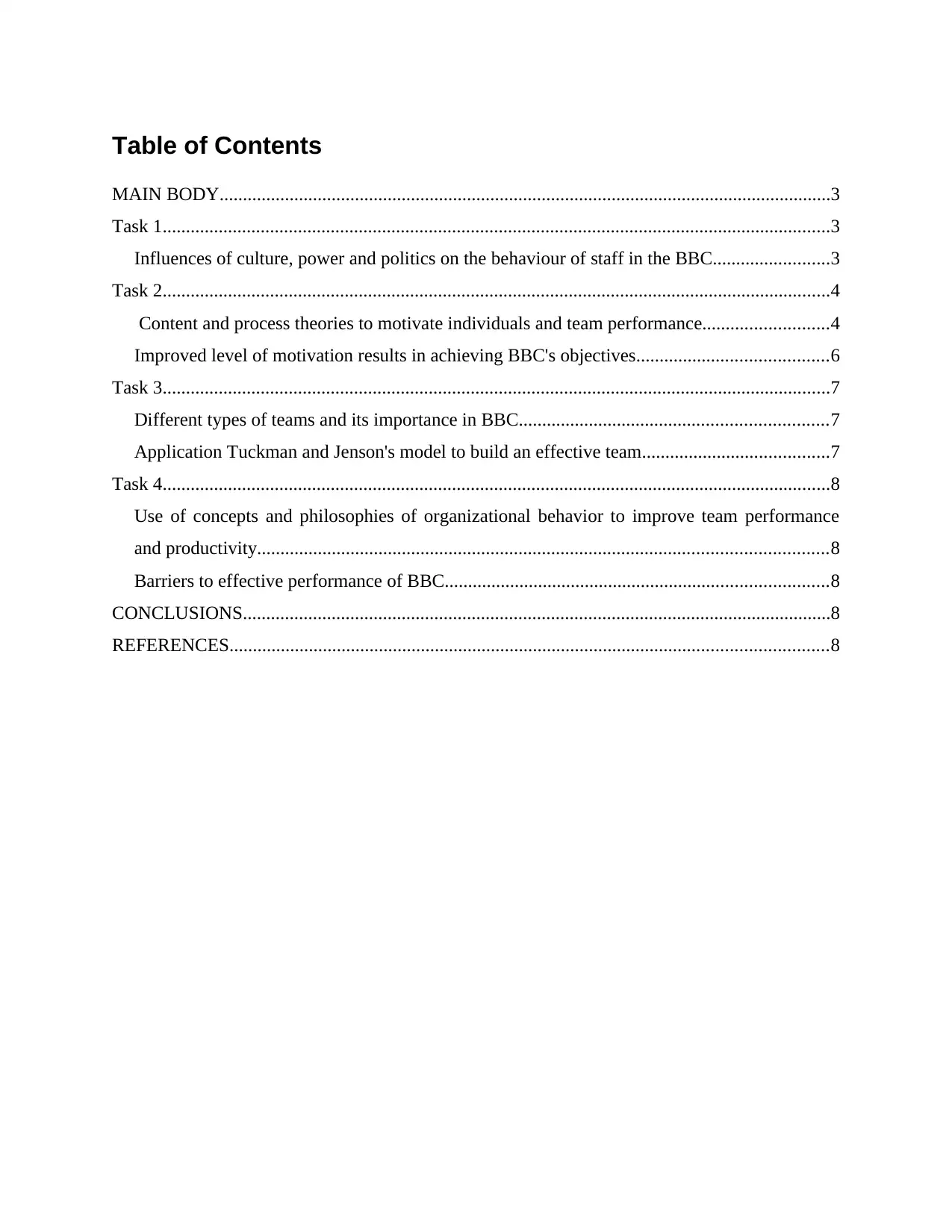
Table of Contents
MAIN BODY...................................................................................................................................3
Task 1...............................................................................................................................................3
Influences of culture, power and politics on the behaviour of staff in the BBC.........................3
Task 2...............................................................................................................................................4
Content and process theories to motivate individuals and team performance...........................4
Improved level of motivation results in achieving BBC's objectives.........................................6
Task 3...............................................................................................................................................7
Different types of teams and its importance in BBC..................................................................7
Application Tuckman and Jenson's model to build an effective team........................................7
Task 4...............................................................................................................................................8
Use of concepts and philosophies of organizational behavior to improve team performance
and productivity..........................................................................................................................8
Barriers to effective performance of BBC..................................................................................8
CONCLUSIONS..............................................................................................................................8
REFERENCES................................................................................................................................8
MAIN BODY...................................................................................................................................3
Task 1...............................................................................................................................................3
Influences of culture, power and politics on the behaviour of staff in the BBC.........................3
Task 2...............................................................................................................................................4
Content and process theories to motivate individuals and team performance...........................4
Improved level of motivation results in achieving BBC's objectives.........................................6
Task 3...............................................................................................................................................7
Different types of teams and its importance in BBC..................................................................7
Application Tuckman and Jenson's model to build an effective team........................................7
Task 4...............................................................................................................................................8
Use of concepts and philosophies of organizational behavior to improve team performance
and productivity..........................................................................................................................8
Barriers to effective performance of BBC..................................................................................8
CONCLUSIONS..............................................................................................................................8
REFERENCES................................................................................................................................8
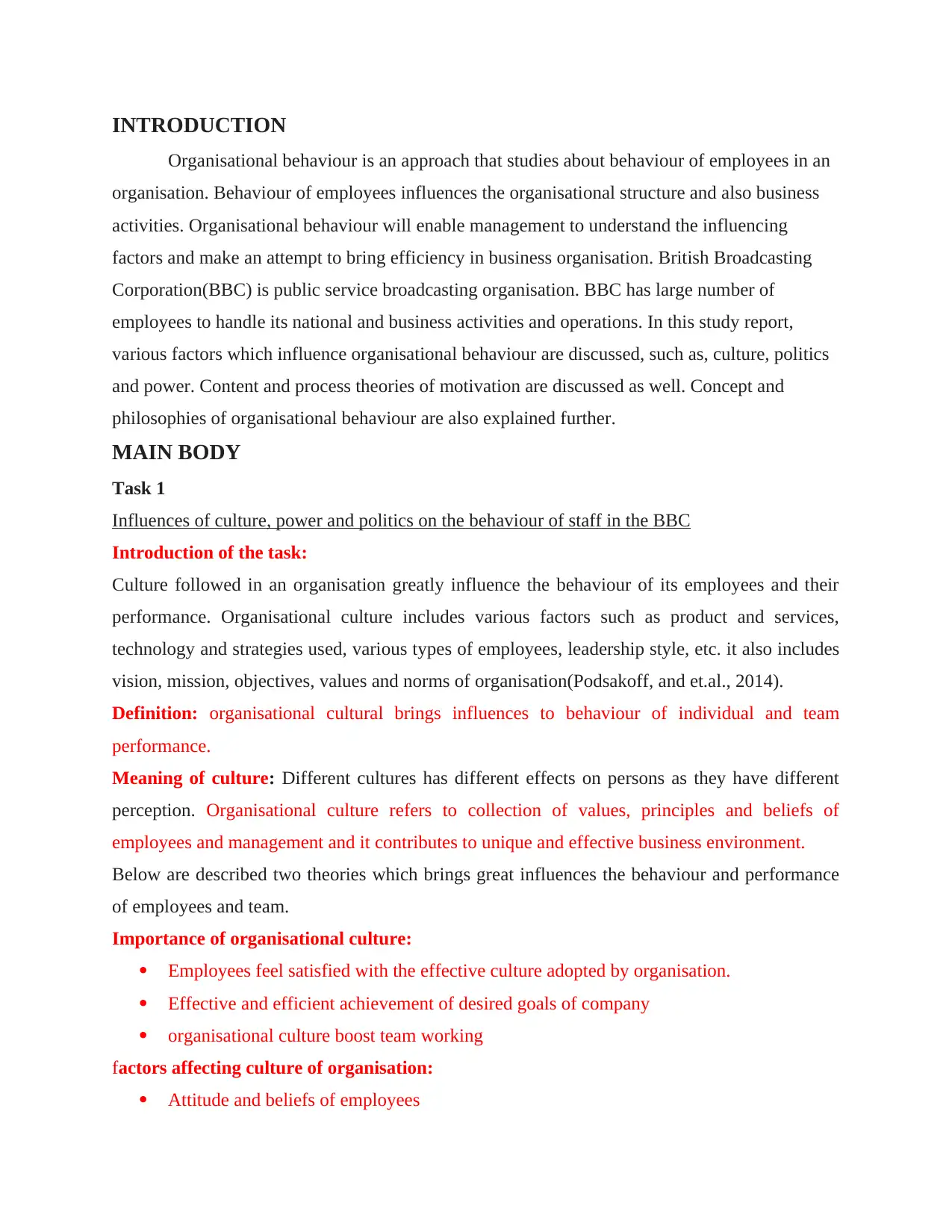
INTRODUCTION
Organisational behaviour is an approach that studies about behaviour of employees in an
organisation. Behaviour of employees influences the organisational structure and also business
activities. Organisational behaviour will enable management to understand the influencing
factors and make an attempt to bring efficiency in business organisation. British Broadcasting
Corporation(BBC) is public service broadcasting organisation. BBC has large number of
employees to handle its national and business activities and operations. In this study report,
various factors which influence organisational behaviour are discussed, such as, culture, politics
and power. Content and process theories of motivation are discussed as well. Concept and
philosophies of organisational behaviour are also explained further.
MAIN BODY
Task 1
Influences of culture, power and politics on the behaviour of staff in the BBC
Introduction of the task:
Culture followed in an organisation greatly influence the behaviour of its employees and their
performance. Organisational culture includes various factors such as product and services,
technology and strategies used, various types of employees, leadership style, etc. it also includes
vision, mission, objectives, values and norms of organisation(Podsakoff, and et.al., 2014).
Definition: organisational cultural brings influences to behaviour of individual and team
performance.
Meaning of culture: Different cultures has different effects on persons as they have different
perception. Organisational culture refers to collection of values, principles and beliefs of
employees and management and it contributes to unique and effective business environment.
Below are described two theories which brings great influences the behaviour and performance
of employees and team.
Importance of organisational culture:
Employees feel satisfied with the effective culture adopted by organisation.
Effective and efficient achievement of desired goals of company
organisational culture boost team working
factors affecting culture of organisation:
Attitude and beliefs of employees
Organisational behaviour is an approach that studies about behaviour of employees in an
organisation. Behaviour of employees influences the organisational structure and also business
activities. Organisational behaviour will enable management to understand the influencing
factors and make an attempt to bring efficiency in business organisation. British Broadcasting
Corporation(BBC) is public service broadcasting organisation. BBC has large number of
employees to handle its national and business activities and operations. In this study report,
various factors which influence organisational behaviour are discussed, such as, culture, politics
and power. Content and process theories of motivation are discussed as well. Concept and
philosophies of organisational behaviour are also explained further.
MAIN BODY
Task 1
Influences of culture, power and politics on the behaviour of staff in the BBC
Introduction of the task:
Culture followed in an organisation greatly influence the behaviour of its employees and their
performance. Organisational culture includes various factors such as product and services,
technology and strategies used, various types of employees, leadership style, etc. it also includes
vision, mission, objectives, values and norms of organisation(Podsakoff, and et.al., 2014).
Definition: organisational cultural brings influences to behaviour of individual and team
performance.
Meaning of culture: Different cultures has different effects on persons as they have different
perception. Organisational culture refers to collection of values, principles and beliefs of
employees and management and it contributes to unique and effective business environment.
Below are described two theories which brings great influences the behaviour and performance
of employees and team.
Importance of organisational culture:
Employees feel satisfied with the effective culture adopted by organisation.
Effective and efficient achievement of desired goals of company
organisational culture boost team working
factors affecting culture of organisation:
Attitude and beliefs of employees
⊘ This is a preview!⊘
Do you want full access?
Subscribe today to unlock all pages.

Trusted by 1+ million students worldwide
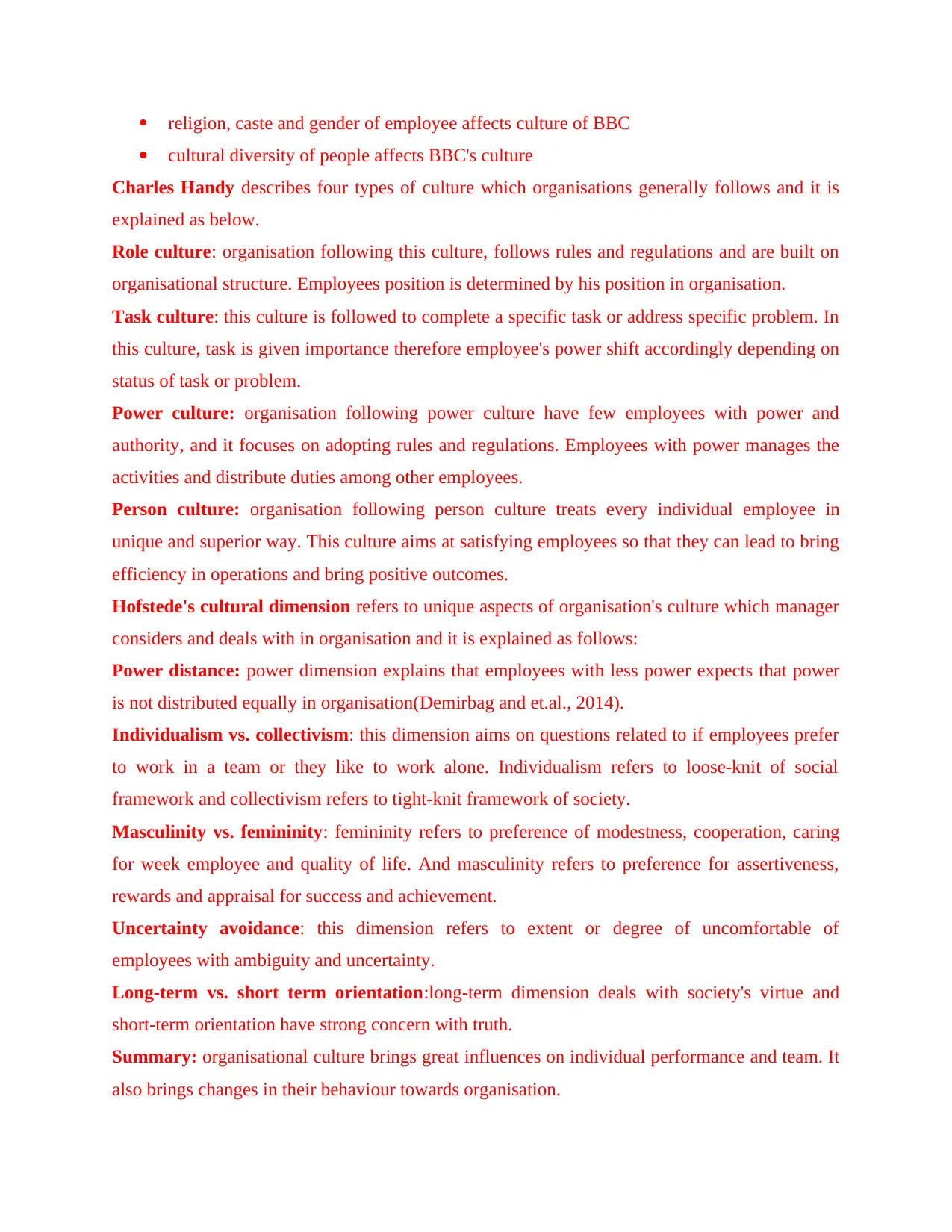
religion, caste and gender of employee affects culture of BBC
cultural diversity of people affects BBC's culture
Charles Handy describes four types of culture which organisations generally follows and it is
explained as below.
Role culture: organisation following this culture, follows rules and regulations and are built on
organisational structure. Employees position is determined by his position in organisation.
Task culture: this culture is followed to complete a specific task or address specific problem. In
this culture, task is given importance therefore employee's power shift accordingly depending on
status of task or problem.
Power culture: organisation following power culture have few employees with power and
authority, and it focuses on adopting rules and regulations. Employees with power manages the
activities and distribute duties among other employees.
Person culture: organisation following person culture treats every individual employee in
unique and superior way. This culture aims at satisfying employees so that they can lead to bring
efficiency in operations and bring positive outcomes.
Hofstede's cultural dimension refers to unique aspects of organisation's culture which manager
considers and deals with in organisation and it is explained as follows:
Power distance: power dimension explains that employees with less power expects that power
is not distributed equally in organisation(Demirbag and et.al., 2014).
Individualism vs. collectivism: this dimension aims on questions related to if employees prefer
to work in a team or they like to work alone. Individualism refers to loose-knit of social
framework and collectivism refers to tight-knit framework of society.
Masculinity vs. femininity: femininity refers to preference of modestness, cooperation, caring
for week employee and quality of life. And masculinity refers to preference for assertiveness,
rewards and appraisal for success and achievement.
Uncertainty avoidance: this dimension refers to extent or degree of uncomfortable of
employees with ambiguity and uncertainty.
Long-term vs. short term orientation:long-term dimension deals with society's virtue and
short-term orientation have strong concern with truth.
Summary: organisational culture brings great influences on individual performance and team. It
also brings changes in their behaviour towards organisation.
cultural diversity of people affects BBC's culture
Charles Handy describes four types of culture which organisations generally follows and it is
explained as below.
Role culture: organisation following this culture, follows rules and regulations and are built on
organisational structure. Employees position is determined by his position in organisation.
Task culture: this culture is followed to complete a specific task or address specific problem. In
this culture, task is given importance therefore employee's power shift accordingly depending on
status of task or problem.
Power culture: organisation following power culture have few employees with power and
authority, and it focuses on adopting rules and regulations. Employees with power manages the
activities and distribute duties among other employees.
Person culture: organisation following person culture treats every individual employee in
unique and superior way. This culture aims at satisfying employees so that they can lead to bring
efficiency in operations and bring positive outcomes.
Hofstede's cultural dimension refers to unique aspects of organisation's culture which manager
considers and deals with in organisation and it is explained as follows:
Power distance: power dimension explains that employees with less power expects that power
is not distributed equally in organisation(Demirbag and et.al., 2014).
Individualism vs. collectivism: this dimension aims on questions related to if employees prefer
to work in a team or they like to work alone. Individualism refers to loose-knit of social
framework and collectivism refers to tight-knit framework of society.
Masculinity vs. femininity: femininity refers to preference of modestness, cooperation, caring
for week employee and quality of life. And masculinity refers to preference for assertiveness,
rewards and appraisal for success and achievement.
Uncertainty avoidance: this dimension refers to extent or degree of uncomfortable of
employees with ambiguity and uncertainty.
Long-term vs. short term orientation:long-term dimension deals with society's virtue and
short-term orientation have strong concern with truth.
Summary: organisational culture brings great influences on individual performance and team. It
also brings changes in their behaviour towards organisation.
Paraphrase This Document
Need a fresh take? Get an instant paraphrase of this document with our AI Paraphraser
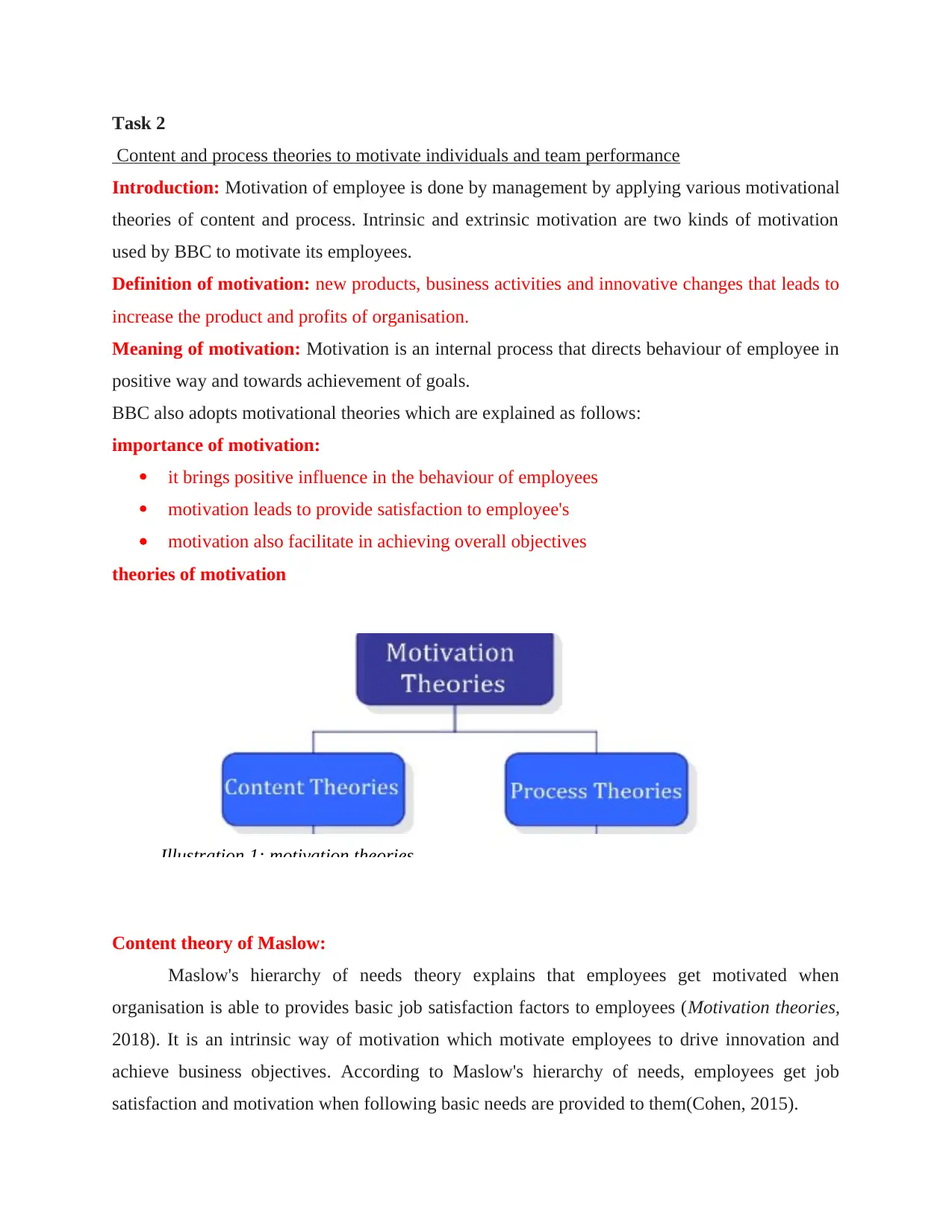
Task 2
Content and process theories to motivate individuals and team performance
Introduction: Motivation of employee is done by management by applying various motivational
theories of content and process. Intrinsic and extrinsic motivation are two kinds of motivation
used by BBC to motivate its employees.
Definition of motivation: new products, business activities and innovative changes that leads to
increase the product and profits of organisation.
Meaning of motivation: Motivation is an internal process that directs behaviour of employee in
positive way and towards achievement of goals.
BBC also adopts motivational theories which are explained as follows:
importance of motivation:
it brings positive influence in the behaviour of employees
motivation leads to provide satisfaction to employee's
motivation also facilitate in achieving overall objectives
theories of motivation
Content theory of Maslow:
Maslow's hierarchy of needs theory explains that employees get motivated when
organisation is able to provides basic job satisfaction factors to employees (Motivation theories,
2018). It is an intrinsic way of motivation which motivate employees to drive innovation and
achieve business objectives. According to Maslow's hierarchy of needs, employees get job
satisfaction and motivation when following basic needs are provided to them(Cohen, 2015).
Illustration 1: motivation theories
Content and process theories to motivate individuals and team performance
Introduction: Motivation of employee is done by management by applying various motivational
theories of content and process. Intrinsic and extrinsic motivation are two kinds of motivation
used by BBC to motivate its employees.
Definition of motivation: new products, business activities and innovative changes that leads to
increase the product and profits of organisation.
Meaning of motivation: Motivation is an internal process that directs behaviour of employee in
positive way and towards achievement of goals.
BBC also adopts motivational theories which are explained as follows:
importance of motivation:
it brings positive influence in the behaviour of employees
motivation leads to provide satisfaction to employee's
motivation also facilitate in achieving overall objectives
theories of motivation
Content theory of Maslow:
Maslow's hierarchy of needs theory explains that employees get motivated when
organisation is able to provides basic job satisfaction factors to employees (Motivation theories,
2018). It is an intrinsic way of motivation which motivate employees to drive innovation and
achieve business objectives. According to Maslow's hierarchy of needs, employees get job
satisfaction and motivation when following basic needs are provided to them(Cohen, 2015).
Illustration 1: motivation theories
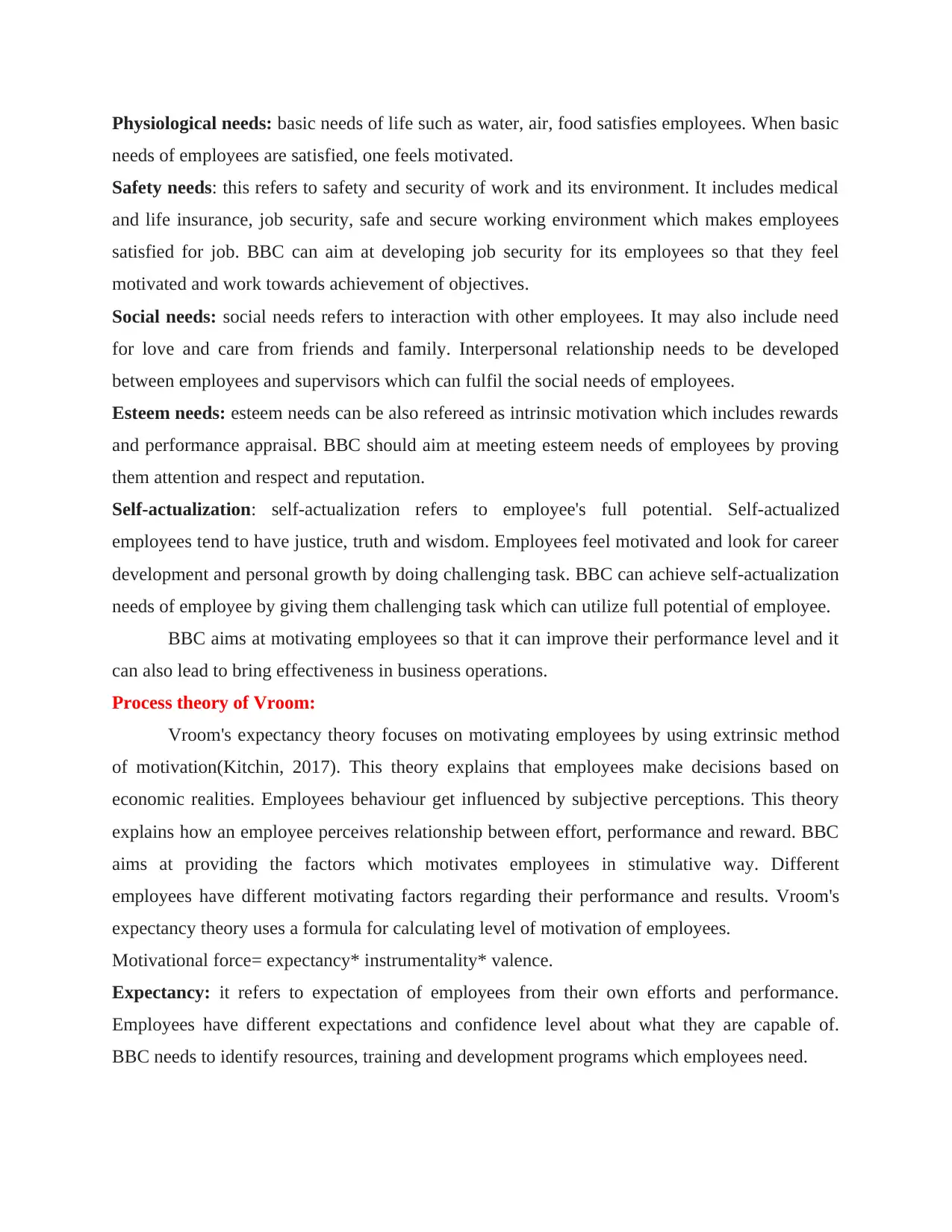
Physiological needs: basic needs of life such as water, air, food satisfies employees. When basic
needs of employees are satisfied, one feels motivated.
Safety needs: this refers to safety and security of work and its environment. It includes medical
and life insurance, job security, safe and secure working environment which makes employees
satisfied for job. BBC can aim at developing job security for its employees so that they feel
motivated and work towards achievement of objectives.
Social needs: social needs refers to interaction with other employees. It may also include need
for love and care from friends and family. Interpersonal relationship needs to be developed
between employees and supervisors which can fulfil the social needs of employees.
Esteem needs: esteem needs can be also refereed as intrinsic motivation which includes rewards
and performance appraisal. BBC should aim at meeting esteem needs of employees by proving
them attention and respect and reputation.
Self-actualization: self-actualization refers to employee's full potential. Self-actualized
employees tend to have justice, truth and wisdom. Employees feel motivated and look for career
development and personal growth by doing challenging task. BBC can achieve self-actualization
needs of employee by giving them challenging task which can utilize full potential of employee.
BBC aims at motivating employees so that it can improve their performance level and it
can also lead to bring effectiveness in business operations.
Process theory of Vroom:
Vroom's expectancy theory focuses on motivating employees by using extrinsic method
of motivation(Kitchin, 2017). This theory explains that employees make decisions based on
economic realities. Employees behaviour get influenced by subjective perceptions. This theory
explains how an employee perceives relationship between effort, performance and reward. BBC
aims at providing the factors which motivates employees in stimulative way. Different
employees have different motivating factors regarding their performance and results. Vroom's
expectancy theory uses a formula for calculating level of motivation of employees.
Motivational force= expectancy* instrumentality* valence.
Expectancy: it refers to expectation of employees from their own efforts and performance.
Employees have different expectations and confidence level about what they are capable of.
BBC needs to identify resources, training and development programs which employees need.
needs of employees are satisfied, one feels motivated.
Safety needs: this refers to safety and security of work and its environment. It includes medical
and life insurance, job security, safe and secure working environment which makes employees
satisfied for job. BBC can aim at developing job security for its employees so that they feel
motivated and work towards achievement of objectives.
Social needs: social needs refers to interaction with other employees. It may also include need
for love and care from friends and family. Interpersonal relationship needs to be developed
between employees and supervisors which can fulfil the social needs of employees.
Esteem needs: esteem needs can be also refereed as intrinsic motivation which includes rewards
and performance appraisal. BBC should aim at meeting esteem needs of employees by proving
them attention and respect and reputation.
Self-actualization: self-actualization refers to employee's full potential. Self-actualized
employees tend to have justice, truth and wisdom. Employees feel motivated and look for career
development and personal growth by doing challenging task. BBC can achieve self-actualization
needs of employee by giving them challenging task which can utilize full potential of employee.
BBC aims at motivating employees so that it can improve their performance level and it
can also lead to bring effectiveness in business operations.
Process theory of Vroom:
Vroom's expectancy theory focuses on motivating employees by using extrinsic method
of motivation(Kitchin, 2017). This theory explains that employees make decisions based on
economic realities. Employees behaviour get influenced by subjective perceptions. This theory
explains how an employee perceives relationship between effort, performance and reward. BBC
aims at providing the factors which motivates employees in stimulative way. Different
employees have different motivating factors regarding their performance and results. Vroom's
expectancy theory uses a formula for calculating level of motivation of employees.
Motivational force= expectancy* instrumentality* valence.
Expectancy: it refers to expectation of employees from their own efforts and performance.
Employees have different expectations and confidence level about what they are capable of.
BBC needs to identify resources, training and development programs which employees need.
⊘ This is a preview!⊘
Do you want full access?
Subscribe today to unlock all pages.

Trusted by 1+ million students worldwide
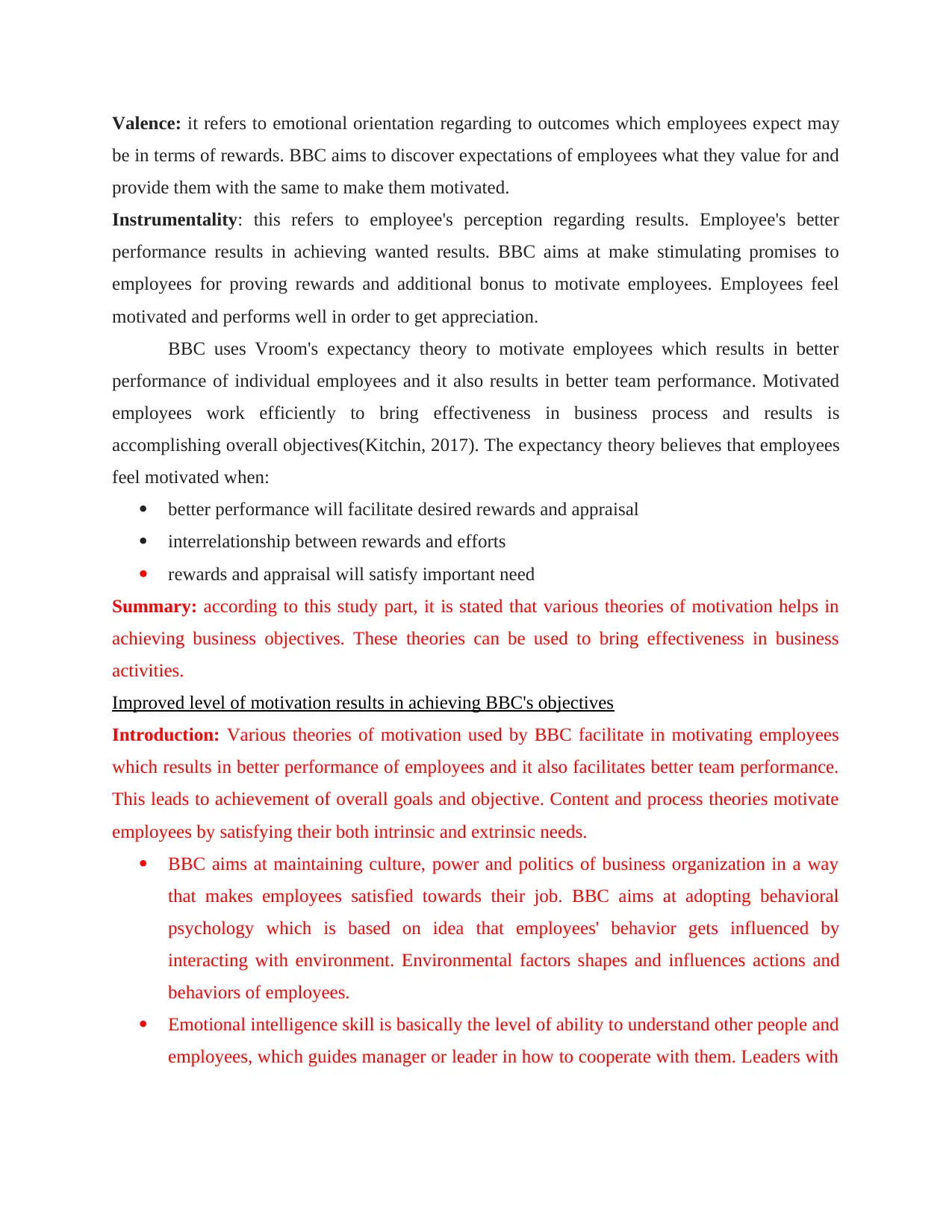
Valence: it refers to emotional orientation regarding to outcomes which employees expect may
be in terms of rewards. BBC aims to discover expectations of employees what they value for and
provide them with the same to make them motivated.
Instrumentality: this refers to employee's perception regarding results. Employee's better
performance results in achieving wanted results. BBC aims at make stimulating promises to
employees for proving rewards and additional bonus to motivate employees. Employees feel
motivated and performs well in order to get appreciation.
BBC uses Vroom's expectancy theory to motivate employees which results in better
performance of individual employees and it also results in better team performance. Motivated
employees work efficiently to bring effectiveness in business process and results is
accomplishing overall objectives(Kitchin, 2017). The expectancy theory believes that employees
feel motivated when:
better performance will facilitate desired rewards and appraisal
interrelationship between rewards and efforts
rewards and appraisal will satisfy important need
Summary: according to this study part, it is stated that various theories of motivation helps in
achieving business objectives. These theories can be used to bring effectiveness in business
activities.
Improved level of motivation results in achieving BBC's objectives
Introduction: Various theories of motivation used by BBC facilitate in motivating employees
which results in better performance of employees and it also facilitates better team performance.
This leads to achievement of overall goals and objective. Content and process theories motivate
employees by satisfying their both intrinsic and extrinsic needs.
BBC aims at maintaining culture, power and politics of business organization in a way
that makes employees satisfied towards their job. BBC aims at adopting behavioral
psychology which is based on idea that employees' behavior gets influenced by
interacting with environment. Environmental factors shapes and influences actions and
behaviors of employees.
Emotional intelligence skill is basically the level of ability to understand other people and
employees, which guides manager or leader in how to cooperate with them. Leaders with
be in terms of rewards. BBC aims to discover expectations of employees what they value for and
provide them with the same to make them motivated.
Instrumentality: this refers to employee's perception regarding results. Employee's better
performance results in achieving wanted results. BBC aims at make stimulating promises to
employees for proving rewards and additional bonus to motivate employees. Employees feel
motivated and performs well in order to get appreciation.
BBC uses Vroom's expectancy theory to motivate employees which results in better
performance of individual employees and it also results in better team performance. Motivated
employees work efficiently to bring effectiveness in business process and results is
accomplishing overall objectives(Kitchin, 2017). The expectancy theory believes that employees
feel motivated when:
better performance will facilitate desired rewards and appraisal
interrelationship between rewards and efforts
rewards and appraisal will satisfy important need
Summary: according to this study part, it is stated that various theories of motivation helps in
achieving business objectives. These theories can be used to bring effectiveness in business
activities.
Improved level of motivation results in achieving BBC's objectives
Introduction: Various theories of motivation used by BBC facilitate in motivating employees
which results in better performance of employees and it also facilitates better team performance.
This leads to achievement of overall goals and objective. Content and process theories motivate
employees by satisfying their both intrinsic and extrinsic needs.
BBC aims at maintaining culture, power and politics of business organization in a way
that makes employees satisfied towards their job. BBC aims at adopting behavioral
psychology which is based on idea that employees' behavior gets influenced by
interacting with environment. Environmental factors shapes and influences actions and
behaviors of employees.
Emotional intelligence skill is basically the level of ability to understand other people and
employees, which guides manager or leader in how to cooperate with them. Leaders with
Paraphrase This Document
Need a fresh take? Get an instant paraphrase of this document with our AI Paraphraser
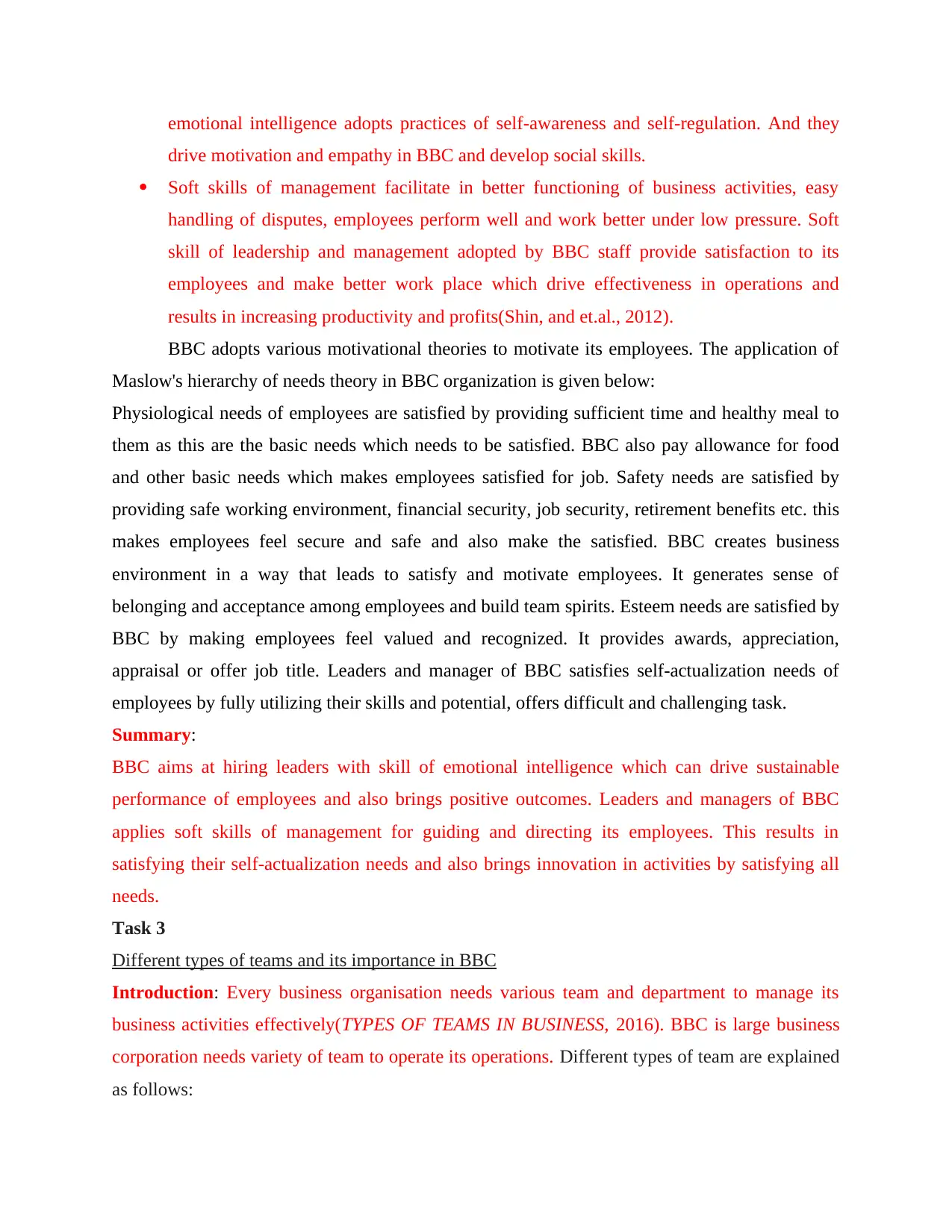
emotional intelligence adopts practices of self-awareness and self-regulation. And they
drive motivation and empathy in BBC and develop social skills.
Soft skills of management facilitate in better functioning of business activities, easy
handling of disputes, employees perform well and work better under low pressure. Soft
skill of leadership and management adopted by BBC staff provide satisfaction to its
employees and make better work place which drive effectiveness in operations and
results in increasing productivity and profits(Shin, and et.al., 2012).
BBC adopts various motivational theories to motivate its employees. The application of
Maslow's hierarchy of needs theory in BBC organization is given below:
Physiological needs of employees are satisfied by providing sufficient time and healthy meal to
them as this are the basic needs which needs to be satisfied. BBC also pay allowance for food
and other basic needs which makes employees satisfied for job. Safety needs are satisfied by
providing safe working environment, financial security, job security, retirement benefits etc. this
makes employees feel secure and safe and also make the satisfied. BBC creates business
environment in a way that leads to satisfy and motivate employees. It generates sense of
belonging and acceptance among employees and build team spirits. Esteem needs are satisfied by
BBC by making employees feel valued and recognized. It provides awards, appreciation,
appraisal or offer job title. Leaders and manager of BBC satisfies self-actualization needs of
employees by fully utilizing their skills and potential, offers difficult and challenging task.
Summary:
BBC aims at hiring leaders with skill of emotional intelligence which can drive sustainable
performance of employees and also brings positive outcomes. Leaders and managers of BBC
applies soft skills of management for guiding and directing its employees. This results in
satisfying their self-actualization needs and also brings innovation in activities by satisfying all
needs.
Task 3
Different types of teams and its importance in BBC
Introduction: Every business organisation needs various team and department to manage its
business activities effectively(TYPES OF TEAMS IN BUSINESS, 2016). BBC is large business
corporation needs variety of team to operate its operations. Different types of team are explained
as follows:
drive motivation and empathy in BBC and develop social skills.
Soft skills of management facilitate in better functioning of business activities, easy
handling of disputes, employees perform well and work better under low pressure. Soft
skill of leadership and management adopted by BBC staff provide satisfaction to its
employees and make better work place which drive effectiveness in operations and
results in increasing productivity and profits(Shin, and et.al., 2012).
BBC adopts various motivational theories to motivate its employees. The application of
Maslow's hierarchy of needs theory in BBC organization is given below:
Physiological needs of employees are satisfied by providing sufficient time and healthy meal to
them as this are the basic needs which needs to be satisfied. BBC also pay allowance for food
and other basic needs which makes employees satisfied for job. Safety needs are satisfied by
providing safe working environment, financial security, job security, retirement benefits etc. this
makes employees feel secure and safe and also make the satisfied. BBC creates business
environment in a way that leads to satisfy and motivate employees. It generates sense of
belonging and acceptance among employees and build team spirits. Esteem needs are satisfied by
BBC by making employees feel valued and recognized. It provides awards, appreciation,
appraisal or offer job title. Leaders and manager of BBC satisfies self-actualization needs of
employees by fully utilizing their skills and potential, offers difficult and challenging task.
Summary:
BBC aims at hiring leaders with skill of emotional intelligence which can drive sustainable
performance of employees and also brings positive outcomes. Leaders and managers of BBC
applies soft skills of management for guiding and directing its employees. This results in
satisfying their self-actualization needs and also brings innovation in activities by satisfying all
needs.
Task 3
Different types of teams and its importance in BBC
Introduction: Every business organisation needs various team and department to manage its
business activities effectively(TYPES OF TEAMS IN BUSINESS, 2016). BBC is large business
corporation needs variety of team to operate its operations. Different types of team are explained
as follows:
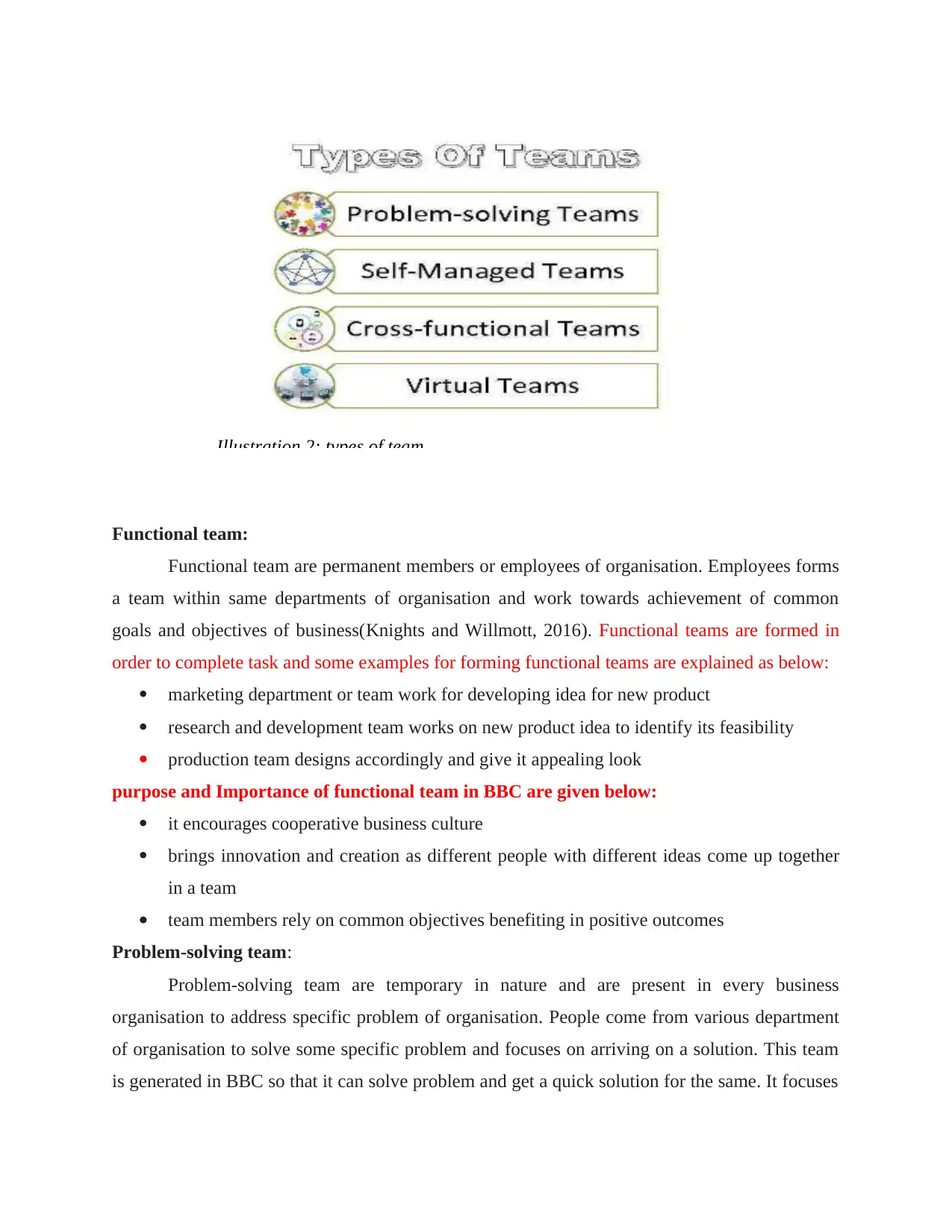
Functional team:
Functional team are permanent members or employees of organisation. Employees forms
a team within same departments of organisation and work towards achievement of common
goals and objectives of business(Knights and Willmott, 2016). Functional teams are formed in
order to complete task and some examples for forming functional teams are explained as below:
marketing department or team work for developing idea for new product
research and development team works on new product idea to identify its feasibility
production team designs accordingly and give it appealing look
purpose and Importance of functional team in BBC are given below:
it encourages cooperative business culture
brings innovation and creation as different people with different ideas come up together
in a team
team members rely on common objectives benefiting in positive outcomes
Problem-solving team:
Problem-solving team are temporary in nature and are present in every business
organisation to address specific problem of organisation. People come from various department
of organisation to solve some specific problem and focuses on arriving on a solution. This team
is generated in BBC so that it can solve problem and get a quick solution for the same. It focuses
Illustration 2: types of team
Functional team are permanent members or employees of organisation. Employees forms
a team within same departments of organisation and work towards achievement of common
goals and objectives of business(Knights and Willmott, 2016). Functional teams are formed in
order to complete task and some examples for forming functional teams are explained as below:
marketing department or team work for developing idea for new product
research and development team works on new product idea to identify its feasibility
production team designs accordingly and give it appealing look
purpose and Importance of functional team in BBC are given below:
it encourages cooperative business culture
brings innovation and creation as different people with different ideas come up together
in a team
team members rely on common objectives benefiting in positive outcomes
Problem-solving team:
Problem-solving team are temporary in nature and are present in every business
organisation to address specific problem of organisation. People come from various department
of organisation to solve some specific problem and focuses on arriving on a solution. This team
is generated in BBC so that it can solve problem and get a quick solution for the same. It focuses
Illustration 2: types of team
⊘ This is a preview!⊘
Do you want full access?
Subscribe today to unlock all pages.

Trusted by 1+ million students worldwide
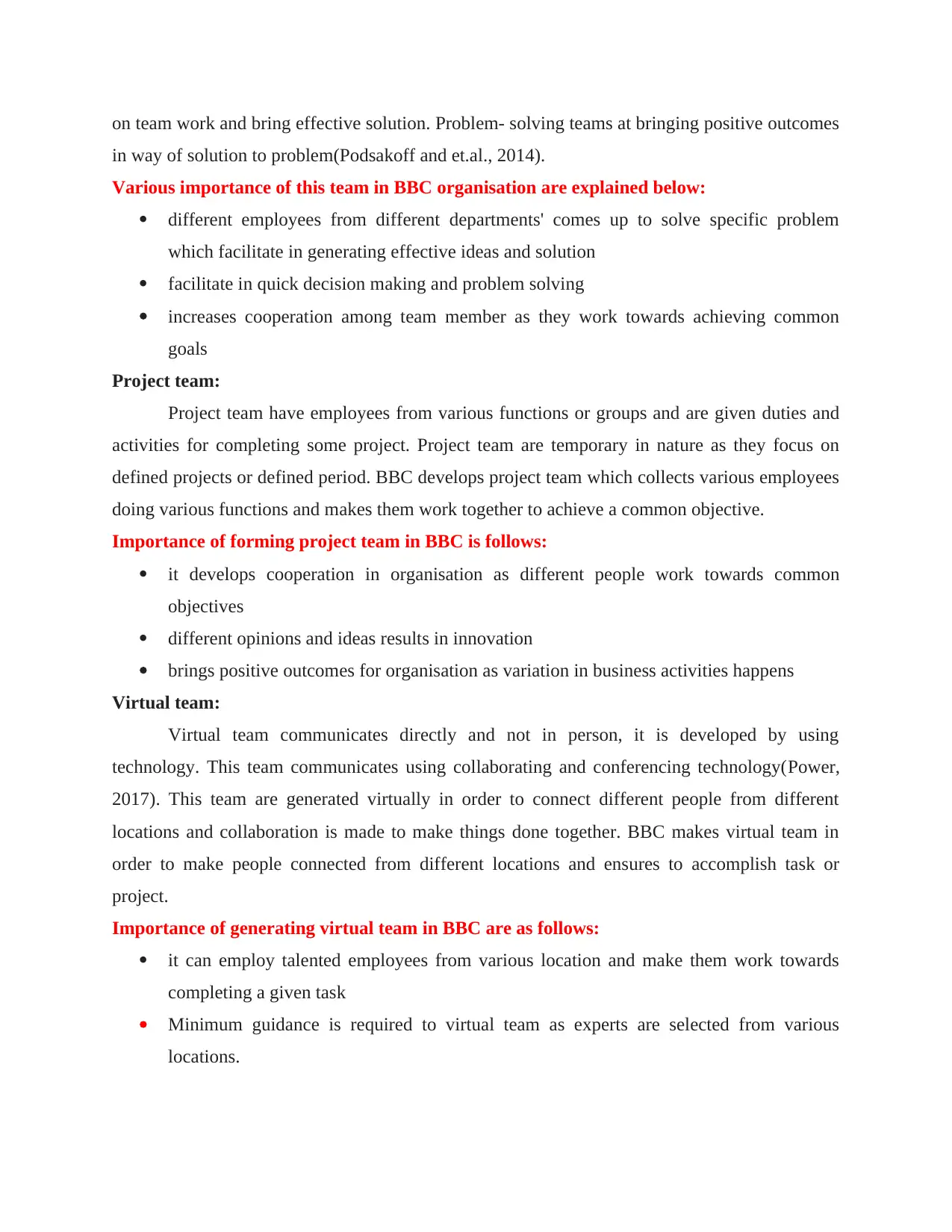
on team work and bring effective solution. Problem- solving teams at bringing positive outcomes
in way of solution to problem(Podsakoff and et.al., 2014).
Various importance of this team in BBC organisation are explained below:
different employees from different departments' comes up to solve specific problem
which facilitate in generating effective ideas and solution
facilitate in quick decision making and problem solving
increases cooperation among team member as they work towards achieving common
goals
Project team:
Project team have employees from various functions or groups and are given duties and
activities for completing some project. Project team are temporary in nature as they focus on
defined projects or defined period. BBC develops project team which collects various employees
doing various functions and makes them work together to achieve a common objective.
Importance of forming project team in BBC is follows:
it develops cooperation in organisation as different people work towards common
objectives
different opinions and ideas results in innovation
brings positive outcomes for organisation as variation in business activities happens
Virtual team:
Virtual team communicates directly and not in person, it is developed by using
technology. This team communicates using collaborating and conferencing technology(Power,
2017). This team are generated virtually in order to connect different people from different
locations and collaboration is made to make things done together. BBC makes virtual team in
order to make people connected from different locations and ensures to accomplish task or
project.
Importance of generating virtual team in BBC are as follows:
it can employ talented employees from various location and make them work towards
completing a given task
Minimum guidance is required to virtual team as experts are selected from various
locations.
in way of solution to problem(Podsakoff and et.al., 2014).
Various importance of this team in BBC organisation are explained below:
different employees from different departments' comes up to solve specific problem
which facilitate in generating effective ideas and solution
facilitate in quick decision making and problem solving
increases cooperation among team member as they work towards achieving common
goals
Project team:
Project team have employees from various functions or groups and are given duties and
activities for completing some project. Project team are temporary in nature as they focus on
defined projects or defined period. BBC develops project team which collects various employees
doing various functions and makes them work together to achieve a common objective.
Importance of forming project team in BBC is follows:
it develops cooperation in organisation as different people work towards common
objectives
different opinions and ideas results in innovation
brings positive outcomes for organisation as variation in business activities happens
Virtual team:
Virtual team communicates directly and not in person, it is developed by using
technology. This team communicates using collaborating and conferencing technology(Power,
2017). This team are generated virtually in order to connect different people from different
locations and collaboration is made to make things done together. BBC makes virtual team in
order to make people connected from different locations and ensures to accomplish task or
project.
Importance of generating virtual team in BBC are as follows:
it can employ talented employees from various location and make them work towards
completing a given task
Minimum guidance is required to virtual team as experts are selected from various
locations.
Paraphrase This Document
Need a fresh take? Get an instant paraphrase of this document with our AI Paraphraser
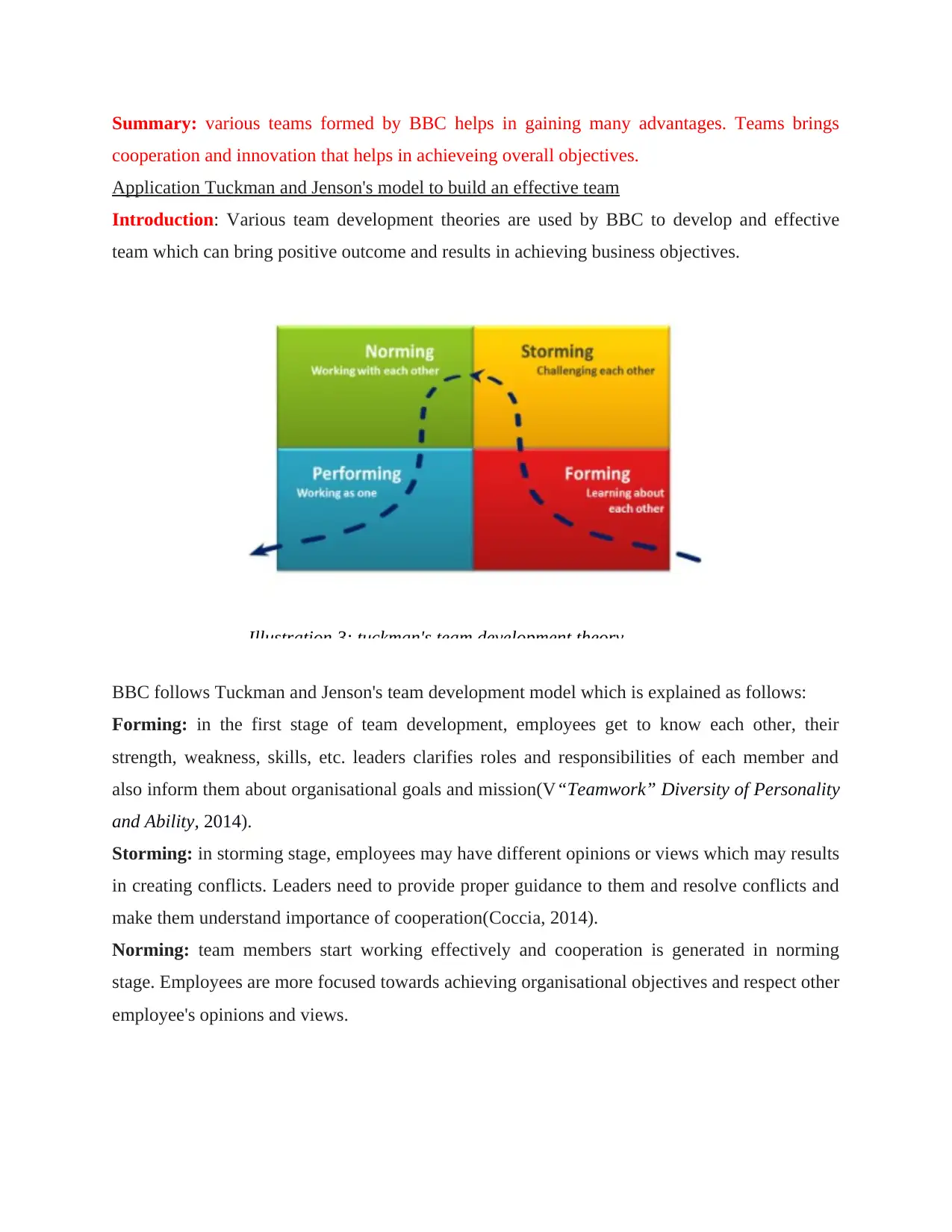
Summary: various teams formed by BBC helps in gaining many advantages. Teams brings
cooperation and innovation that helps in achieveing overall objectives.
Application Tuckman and Jenson's model to build an effective team
Introduction: Various team development theories are used by BBC to develop and effective
team which can bring positive outcome and results in achieving business objectives.
BBC follows Tuckman and Jenson's team development model which is explained as follows:
Forming: in the first stage of team development, employees get to know each other, their
strength, weakness, skills, etc. leaders clarifies roles and responsibilities of each member and
also inform them about organisational goals and mission(V“Teamwork” Diversity of Personality
and Ability, 2014).
Storming: in storming stage, employees may have different opinions or views which may results
in creating conflicts. Leaders need to provide proper guidance to them and resolve conflicts and
make them understand importance of cooperation(Coccia, 2014).
Norming: team members start working effectively and cooperation is generated in norming
stage. Employees are more focused towards achieving organisational objectives and respect other
employee's opinions and views.
Illustration 3: tuckman's team development theory
cooperation and innovation that helps in achieveing overall objectives.
Application Tuckman and Jenson's model to build an effective team
Introduction: Various team development theories are used by BBC to develop and effective
team which can bring positive outcome and results in achieving business objectives.
BBC follows Tuckman and Jenson's team development model which is explained as follows:
Forming: in the first stage of team development, employees get to know each other, their
strength, weakness, skills, etc. leaders clarifies roles and responsibilities of each member and
also inform them about organisational goals and mission(V“Teamwork” Diversity of Personality
and Ability, 2014).
Storming: in storming stage, employees may have different opinions or views which may results
in creating conflicts. Leaders need to provide proper guidance to them and resolve conflicts and
make them understand importance of cooperation(Coccia, 2014).
Norming: team members start working effectively and cooperation is generated in norming
stage. Employees are more focused towards achieving organisational objectives and respect other
employee's opinions and views.
Illustration 3: tuckman's team development theory
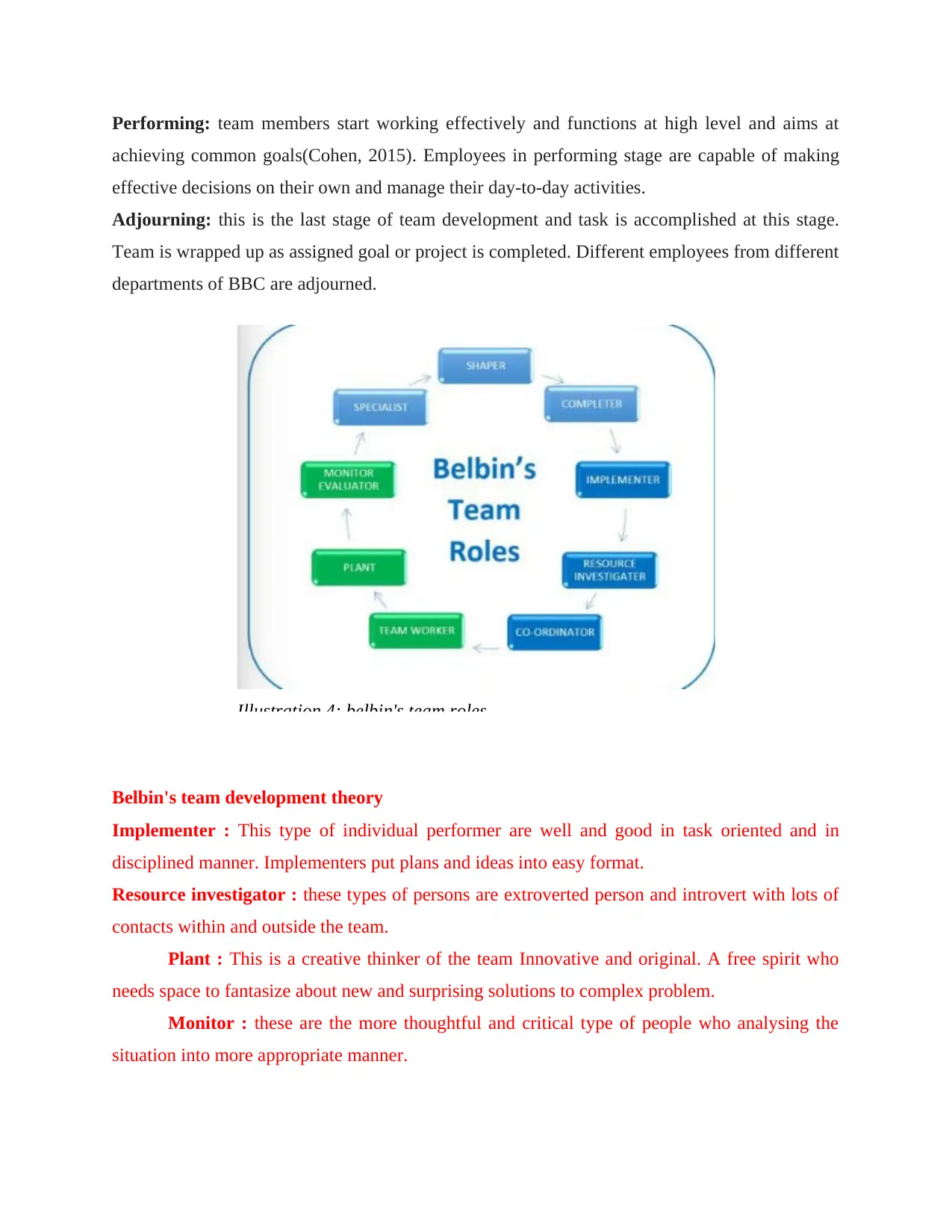
Performing: team members start working effectively and functions at high level and aims at
achieving common goals(Cohen, 2015). Employees in performing stage are capable of making
effective decisions on their own and manage their day-to-day activities.
Adjourning: this is the last stage of team development and task is accomplished at this stage.
Team is wrapped up as assigned goal or project is completed. Different employees from different
departments of BBC are adjourned.
Belbin's team development theory
Implementer : This type of individual performer are well and good in task oriented and in
disciplined manner. Implementers put plans and ideas into easy format.
Resource investigator : these types of persons are extroverted person and introvert with lots of
contacts within and outside the team.
Plant : This is a creative thinker of the team Innovative and original. A free spirit who
needs space to fantasize about new and surprising solutions to complex problem.
Monitor : these are the more thoughtful and critical type of people who analysing the
situation into more appropriate manner.
Illustration 4: belbin's team roles
achieving common goals(Cohen, 2015). Employees in performing stage are capable of making
effective decisions on their own and manage their day-to-day activities.
Adjourning: this is the last stage of team development and task is accomplished at this stage.
Team is wrapped up as assigned goal or project is completed. Different employees from different
departments of BBC are adjourned.
Belbin's team development theory
Implementer : This type of individual performer are well and good in task oriented and in
disciplined manner. Implementers put plans and ideas into easy format.
Resource investigator : these types of persons are extroverted person and introvert with lots of
contacts within and outside the team.
Plant : This is a creative thinker of the team Innovative and original. A free spirit who
needs space to fantasize about new and surprising solutions to complex problem.
Monitor : these are the more thoughtful and critical type of people who analysing the
situation into more appropriate manner.
Illustration 4: belbin's team roles
⊘ This is a preview!⊘
Do you want full access?
Subscribe today to unlock all pages.

Trusted by 1+ million students worldwide
1 out of 17
Related Documents
Your All-in-One AI-Powered Toolkit for Academic Success.
+13062052269
info@desklib.com
Available 24*7 on WhatsApp / Email
![[object Object]](/_next/static/media/star-bottom.7253800d.svg)
Unlock your academic potential
Copyright © 2020–2026 A2Z Services. All Rights Reserved. Developed and managed by ZUCOL.





